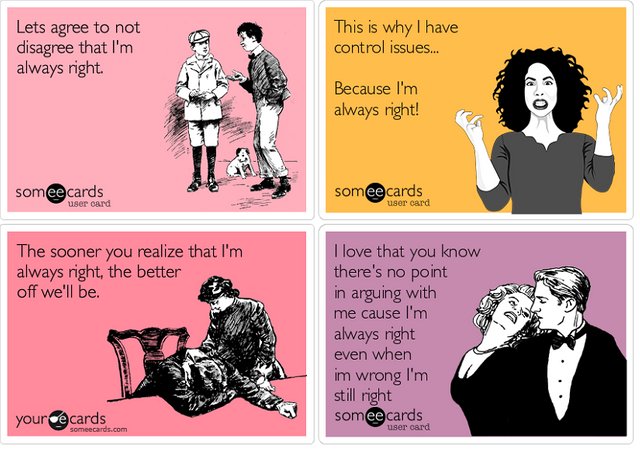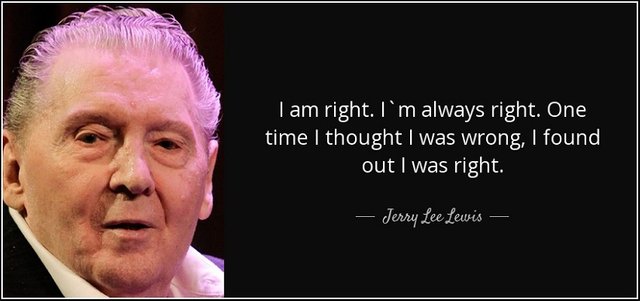[PSYCHOLOGY] The Destructive Desire to Always Be Right
What is it that characterizes the need to be right in general, a need that is found in everyone who consider themselves relatively normal? In this need we can recognize a stronger internal pressure, an impatience to getting our own position confirmed as the only possible, logical and consistent one. In the schizo-paranoid position with narcissistic reinforcement of the 'wall', the difference between my own and the other's viewpoint is also strengthened - I am right and he is wrong. The black and white and the narcissistic coincides with the authoritarian.

This pressure doesn't always have to be aggressive. What characterizes it is a coarser, more primitive, totalitarian emotional image, which we can also perceive as more childish. In this temporary infantilized state, we think as a sports audience, where the impulses are allowed to push reason away. We are becoming more simplistic and find legitimate reasons for both fierce rage and blind love.
The authoritarian person, whether temporary or permanent authoritarian, uses adult words, but expresses himself as frustrated children can do: "it wasn't me, you started it, you're stupid, you'll never see me again! Give me my stuff back!" or as expressed in 'adult' words: "It's your fault that this situation has occurred, I only feel disdain for you and have no intention to co-operate with you any more. Could you please return all my possessions!"
However, the authoritative person can hide his personality behind different more or less sophisticated manipulations to confuse the other: "Let's agree to do it the way I just outlined. I hope you can realize that this it is the only possible solution and really in everyone's best interest."

But, despite this supposedly adult language, I believe that this person is in a state of infantilization or regression, in which he conceals the state with the use of an adult language. Not least, this is often seen in the inflammatory strong emotions, which can occasionally break out. In this regressive state, the person is extremely easily hurt, on the verge of feeling persecuted, and is often at the height of what can be called infantile omnipotence, ie. the almighty sense that little children experience before they are disillusioned.
Therefore, the individual can not perceive that there may be conflicts with two different views on one question. In the childish feeling of omnipotence the other is wrong and I'm right. All the talk of different approaches, conflicts, etc., is just avoiding bullshit and suggests that the other is lying or is an idiot, who can't realize that I KNOW HOW IT IS!
The other often has a strange feeling of being in front of someone who is both a self-assured giant and a child. This giant baby is someone we all have inside of us, if we are to be completely self-honest, but most of us are able to acknowledge and stop it from influencing us and others. It's a little bit like the devil that sits on the shoulder of some cartoon character. He wants to revenge, fight and punish, while the angel sees the good opportunities. The devil, or the giant baby, is always there as a regressive potential, and it's me, as a reasonable, integrated and whole person, who has the ability to refuse to act on the chatter in the secret mind, and the responsibility to investigate where from such patterns took root in my personality.

When the infant becomes curious about the external reality, at the same time, the feeling of omnipotence is mobilized with a direct opposite striving. This feeling wants to deny the external reality and the effort or disillusionment required to handle it. Reality means lack, absence and desire, which requires patient waiting from the growing child with the help of hope and trust. Instead, the way out for the feeling of omnipotence is to hatefully attempting to wipe out, deny and discontinue interaction with a world that doesn't seem to care about the individual's wishes. The child instead develops a personality characterized by self-sufficiency, almightiness and all-knowingness. All dependency must be averted by constantly seeking to prove the own invulnerability, needlessness and perfection.
The weakness or fear of self-annihilation is precisely what drives the feeling of omnipotence. Without that filter, the individual is constantly reminded of the gap between the demands of their own needs and the shortcomings of a frustrating world. Instead, the feeling of omnipotence leads to a challenging and demanding attitude to the world - including the people in it. They must behave as perfection demands. Instead of hunger for new experiences (which are perceived as threatening), the individual strives for confirmation and assurance.
This path into the destructive dead end of omnipotence seems to have just those factors that can be used to describe the origin of the authoritarian personality type. Therefore, one can say that the destructive omnipotence in the narcissistic part of us seems to be one of the paths leading to authoritarian personalities. At the same time, this is universal as I have already touched upon. Thus, it does not only concern a small number of pathologically disturbed individuals, but all of us in our more or less remaining narcissistic personality parts. How much of it that remains is naturally directly correlated to parenting styles. In this way, the narcissistic structure is also an important puzzle piece when it comes to the background of the authoritarian personality - not the only but a significant one, because it's always there as a reinforcement or impetus to develop the authoritarian attitude.

Perhaps the following is an apt sequence: If you are fatherless, ie. haven't been able to admire a paternal figure that could be gradually disillusioned, and if you haven't been treated early with enough empathy by a mother, to gradually disillusion the image of your own omnipotence, there will be a continuing need to idealize both others and oneself. The fragmented aggressiveness, which is a consequence of this traumatization, will furthermore push for this idealization into authoritarian impatience and seeking simple, quick solutions to problems. If you meet a system that performs potential authorizations - ideologies, leaders, fanatics, gurus, YouTube personalities - this system will meet the need for authoritarian idealization. Because we all have some of such traumatization within us, we're always more or less sensitive to the promises of seductive charlatans (I could think of a few contemporary YouTube personalities, but I'll leave it at that.)

excellent article my friend
Thank you @kyriacos, I'm glad you found it interesting!
This reminds me of something my father always said. From when I was young he has told me the following: whenever someone of us is arguing with your mother, know that she is always right, whatever she might say :p
Thankfully we are all different, with different backgrounds. Knowing ones history will normally guide you into the future. Interesting read @steemswede in parting.
"One who causes others misfortune also teaches them wisdom." ~ African proverb
upvoted and followed you if you like fitnessallione please follow me